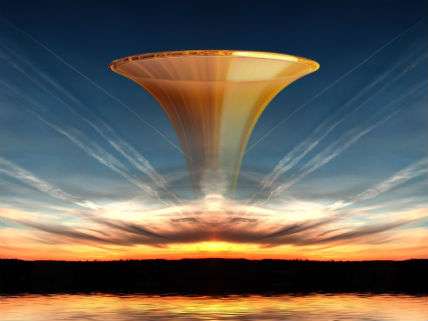When Did WW3 Start? Let's Talk About Sanctuary Cities and the Radical Left Instead
CPAC panel underdelivers.

"When did World War 3 start?" asked an afternoon CPAC panel featuring Milwaukee County Sheriff David Clarke. He was relevant because the panel was the first of two on WW3. Today's was on "the threat at home" and tomorrow will be "the threat abroad." The panel didn't turn out that way.
"How many people feel scared?" panel moderator Ginni Thomas of the Daily Caller asked the audience at the beginning of the panel. "Can I get an amen?" Security, she noted, was a primary reason many people vote.
Clarke spoke first because, according to Thomas, he had the most Twitter followers, which was how Thomas determined the order. Clarke focused mostly on sanctuary cities and border security, saying the time had come to begin to "aggressively enforce the rule of law in America."
"Sanctuary cities are havens for criminals," Clarke insisted, ignoring the history of sanctuary cities as a policy supported by law enforcement to secure the cooperation of illegal immigrants in criminal investigations.
Clarke never got around to explaining how illegal immigration connected to WW3. He did not bring up, for example, overblown claims popular in the right-wing echo chamber about terrorist fighters crossing in from Mexico.
Instead, Clarke suggested prosecuting one mayor for the sanctuary city policy, saying that would have a chilling effect on other sanctuary city officials.
The second panelist, New Zealand author Trevor Loudon, led with the WW3 hook. "WW3 started about 1400 years ago, and it got a big boost during the Bolshevik revolution," Lauden suggested, because of Islamists and communists.
He went on to praise the U.S. for defending freedom in the South Pacific during World War 2. The U.S. "keeps all of the world stable and all of the world free," Loudon insisted, repeating tired talking points about Barack Obama's foreign policy aiding U.S. enemies and hurting U.S. allies, a strange point to hold on to during the nascent Trump administration, given President Trump's willingness to talk tough to traditional U.S. allies like Australia or NATO.
Loudon pivoted to the "radical left" plan to undermine America, tying anti-Trump protests to that effort. He called on attendees to support Trump through social media if they "cared about America," saying the medium made it possible to combat all kinds of radicals.
Former CIA employee Claire Lopez, of the Center for Security Policy, spoke third, talking about "civilization jihad."
"We are not fighting terrorism," Lopez insisted, "we are fighting the forces of Islamic jihad and sharia."
She insisted the U.S. was fighting for individual liberty, equality for all, human dignity, and the consent of the governed, saying those concepts were "anathema and even blasphemy" for Islamists. Fears over sharia law, however, are anathema to some of the ideals Lopez herself said the U.S. fought for.
It went downhill from there. Lopez claimed, without providing any specifics, that the government and national security apparatus, and even local law enforcement, were "deeply penetrated" by the Muslim Brotherhood, a common right-wing bugaboo.
The last speaker was acting Federal Trade Commissioner Maureen Olhausen. How did she fit into the theme of World War 3? She came to speak about intellectual property and warn about the effort to "devalue" intellectual property rights in the U.S., which she said discouraged investment at home and encouraged intellectual property theft abroad. Olhausen mentioned China in passing as one of those countries, but did not make it her focus nor did she place China within a working theory of a World War 3 that had already started, sticking to more generic descriptions of the U.S. being "under attack" by those who would steal intellectual property.
"It's gonna be fight every day, I'm up for it," David Clarke said during the concluding remarks. "Are you?"
The panel was disappointing. The framework of a putative World War 3 can be an interesting one through which to think through U.S. foreign policy issues and options. One could argue WW3 started on 9/11, or during the First Gulf War, or in 1979 during the Islamic revolution in Iran, or even further back. Any of these starting points could yield interesting questions about and critiques of U.S. foreign policy.
Arguably, even, neither World War 1 nor World War 2 have completely played out. Many of the tensions arising from NATO's role in the world come from it being a post-war, Cold War-era alliance operating in a post-Cold War world. Many of the geopolitical issues in the Middle East, meanwhile, can be traced to the collapse of the Ottoman Empire, which chose the losing side in WW1.
Instead of any of that however, perhaps unsurprisingly, the panel became a hodgepodge of security-related issues not connected by any over-arching theme other than fear. While today was supposed to be about "the threat at home," not even that became a unifying theme for the panel.
Tomorrow's panel on WW3 and "the threat abroad" starts at 8:15a.m.
Related: Don't Talk WW3 Blues


Show Comments (47)